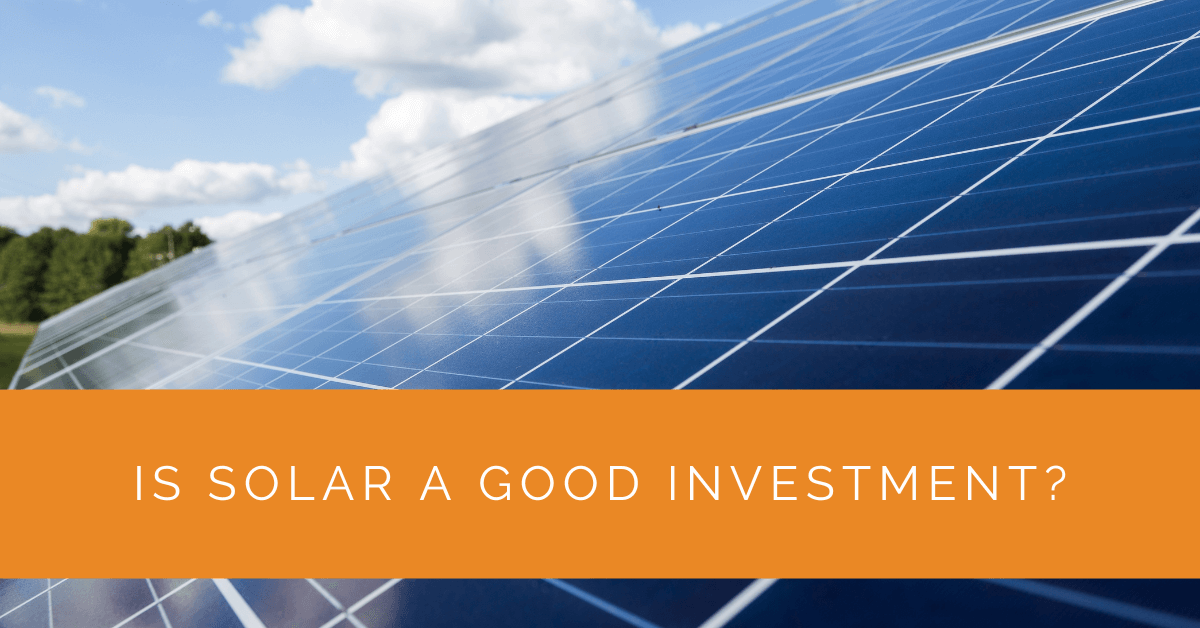With the increasing popularity of solar energy, many homeowners wonder if going solar is a good investment. Beyond its positive environmental impact, solar energy offers numerous financial advantages. This article will explore the financial and non-financial benefits of solar energy as an investment, helping homeowners make informed decisions about installing solar panel systems.
Contents
- 1 Key Takeaways
- 2 Understanding the Financial Benefits of Solar Energy
- 3 Evaluating the Factors that Determine Solar Investment Returns
- 4 Assessing Non-Financial Benefits of Solar Energy
- 5 Making an Informed Decision
- 6 So, Is Solar a Good Investment?
- 7 Case Study: Evaluating Solar Energy as a Long-Term Investment
- 8 Expert Insights From Our Solar Panel Installers About Investing in Solar Energy
- 9 Experience Solar Excellence with Us!
- 10 Conclusion
- 11 FAQ
Key Takeaways
- Solar energy is a good investment due to its significant financial benefits, including long-term savings, the potential return on investment, and the ability to offset rising energy costs.
- Evaluating system cost, financing options, energy production, incentives, and maintenance helps determine the financial feasibility and returns of solar panel installations.
- Beyond financial advantages, solar energy offers non-financial benefits such as environmental sustainability, energy independence, increased property value, and marketability.
Understanding the Financial Benefits of Solar Energy
Solar energy offers significant financial benefits to homeowners, providing long-term savings and return on investment. Understanding these benefits is crucial for evaluating the financial viability of solar panel installations.
Rising Energy Costs and Savings
Conventional energy costs have steadily increased, making solar energy an attractive alternative. By generating clean and renewable energy from the sun, homeowners can offset their reliance on grid electricity and reduce their energy bills. The savings achieved through solar energy can be substantial, providing financial relief and stability in the face of rising energy costs.
Return on Investment (ROI) in Solar Energy
Return on investment (ROI) is an essential metric for evaluating the financial performance of any investment, including solar energy systems. Solar panels have the potential to deliver excellent ROI due to the significant savings generated through reduced energy bills. The ROI in solar energy is often comparable to, if not better, other investment options such as stocks, bonds, or real estate. The ability to generate clean energy and earn financial returns makes solar a compelling investment choice.
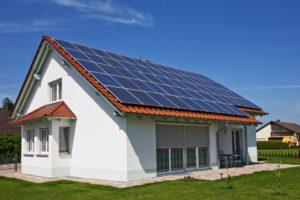
Evaluating the Factors that Determine Solar Investment Returns
Several factors are crucial in determining the returns on solar panel investments. Evaluating these factors helps homeowners decide about installing solar panels and maximize their financial benefits.
System Cost and Financing Options
The upfront cost of a solar panel system is an important consideration for homeowners. However, falling system prices and various financing options have made solar installations more affordable and accessible. Homeowners can choose between purchasing the system outright, leasing, or opting for solar loans. Each financing option has advantages and considerations, such as the impact on upfront costs, ownership, maintenance responsibilities, and potential savings over the system’s lifetime. Assessing the system cost and understanding the available financing options is crucial for evaluating the financial feasibility of solar investments.
Energy Production and Savings
Energy production and subsequent savings are key factors in determining the financial benefits of solar panel installations. Several factors influence the energy production potential of a solar system, including the system size, panel efficiency, orientation, tilt angle, and local sunlight availability. By accurately estimating the energy production based on these factors and comparing it to the homeowner’s energy consumption, it is possible to determine the potential savings over the system’s lifetime. These energy savings directly impact the financial returns of the solar investment.
Solar Incentives and Tax Credits
Solar incentives and tax credits at the federal, state, and local levels can significantly enhance the financial returns of solar panel installations. The Federal Investment Tax Credit (ITC) provides a substantial tax credit based on a percentage of the system’s cost. State-level incentives, such as rebates, grants, and performance-based incentives, further reduce the upfront cost or offer additional financial benefits. Researching and understanding the available incentives specific to one’s location is crucial for maximizing financial returns and shortening the payback period of solar investments.
Maintenance and Lifespan Considerations
Solar panels are durable and require minimal maintenance. However, regular cleaning and inspection are recommended to ensure optimal performance and maximize energy production. Understanding the warranty terms, maintenance requirements, and the average lifespan of solar panels is important for accurate financial projections. A well-maintained solar panel system ensures the longevity of the investment and contributes to maximizing the financial returns over its operational lifetime.
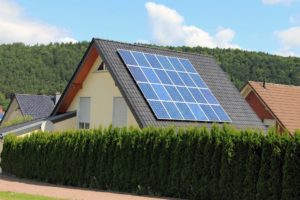
Assessing Non-Financial Benefits of Solar Energy
In addition to the financial advantages, solar energy offers several non-financial benefits that further enhance its value as an investment.
Environmental Impact and Sustainability
Solar energy is a clean and renewable source of power that produces electricity without harmful emissions. By switching to solar, homeowners significantly reduce their carbon footprint and contribute to combating climate change. Embracing solar energy aligns with a commitment to sustainability, promoting a cleaner and greener future for generations to come. By investing in solar energy, homeowners actively participate in the transition to a more sustainable and environmentally responsible energy system.
Energy Independence and Resilience
One of the notable non-financial benefits of solar energy is its increased energy independence and resilience. Solar panel systems enable homeowners to generate electricity, reducing their reliance on utility companies and the grid. This energy independence offers peace of mind during power outages or grid disruptions, as solar-powered homes can continue to operate critical appliances and devices. By having a self-sustaining energy source, homeowners gain greater control over their energy needs and become more resilient to external energy supply challenges.
Improved Property Value and Marketability
Investing in solar panels can enhance the value and marketability of a property. Solar-powered homes have become increasingly attractive to buyers, offering potential energy cost savings and a sustainable lifestyle. Studies have shown that homes with solar panels sell faster and at higher prices than homes without solar. This increased property value can provide additional financial benefits and a competitive edge in the real estate market.
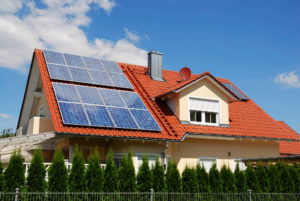
Making an Informed Decision
When considering solar panel installations, making an informed decision is crucial to ensure the best outcome. Several factors must be carefully evaluated to determine the feasibility and potential returns of going solar.
Assessing Energy Needs and Consumption Patterns
Understanding your energy needs and consumption patterns is fundamental to appropriately sizing the solar panel system. By analyzing historical energy usage data and considering future energy requirements, homeowners can determine the optimal system size that meets their needs while maximizing energy savings. Additionally, identifying energy-saving opportunities, such as upgrading to energy-efficient appliances or adopting energy-conscious habits, can further optimize the benefits of solar energy.
Evaluating Available Roof Space and Orientation
Assessing the available roof space and its orientation is essential for determining the solar panel system’s capacity. Roofs with ample unobstructed sunlight exposure throughout the day are ideal for maximizing energy production. Factors such as roof angle, shading from nearby structures or trees, and structural integrity should also be considered during the evaluation process.
Understanding Local Regulations and Permits
Before proceeding with a solar panel installation, homeowners should familiarize themselves with local regulations and obtain necessary permits. Compliance with building codes, zoning restrictions, and homeowners’ association guidelines is crucial to ensure a smooth and hassle-free installation process. Consulting with solar professionals or local authorities can provide valuable guidance in navigating these requirements.
Consulting with Solar Professionals
Seeking advice from reputable solar professionals is highly recommended when considering solar panel installations. Solar professionals possess the expertise to perform site assessments, accurately size the system, and provide detailed financial projections. They can also help homeowners understand the available financing options, incentives, and tax credits specific to their location. By consulting with solar professionals, homeowners can make informed decisions, receive customized recommendations, and gain peace of mind throughout solar panel installation.
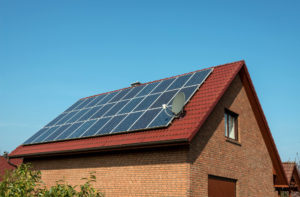
So, Is Solar a Good Investment?
Solar energy is a good investment for homeowners due to its financial and environmental benefits. The long-term cost savings achieved through reduced energy bills and potential return on investment make solar panels a financially rewarding choice. The upfront cost can be significantly reduced with available incentives and tax credits, increasing the overall financial feasibility.
Furthermore, solar energy contributes to a sustainable and eco-friendly future. By adopting solar power, homeowners actively combat climate change by reducing their carbon footprint and reliance on fossil fuels. Solar panels produce clean electricity without harmful emissions, aligning with global efforts to transition to renewable energy sources.
To determine the suitability of solar panel installations, evaluating factors such as upfront costs, available sunlight, local regulations, and individual energy needs is essential. Consulting with solar professionals and conducting thorough assessments will ensure informed decision-making and a successful solar energy journey. By investing in solar energy, homeowners can enjoy long-term financial benefits while contributing to a cleaner and greener world.
Case Study: Evaluating Solar Energy as a Long-Term Investment
Background
At Solar Panels Network USA, we are committed to helping homeowners make informed decisions about solar energy investments. With the increasing popularity of solar power, many are curious about the financial and non-financial benefits it offers. This case study demonstrates how solar energy can be a lucrative investment for homeowners.
Project Overview
A homeowner approached us with concerns about rising energy costs and the long-term financial feasibility of investing in solar panels. They sought to understand how solar energy could offset these costs while providing a reliable return on investment (ROI). Our objective was to demonstrate the financial and non-financial benefits of going solar.
Implementation
- Consultation and Assessment: We conducted a thorough assessment of the homeowner’s energy consumption patterns, available roof space, and local sunlight exposure. This helped us determine the optimal system size and configuration to maximize energy production and savings.
- System Cost and Financing Options: We provided a detailed analysis of the upfront cost of the solar panel system, including various financing options such as purchasing outright, leasing, and solar loans. By comparing these options, the homeowner could choose the most suitable financing method that aligned with their budget and long-term financial goals.
- Energy Production and Savings Estimation: Using advanced simulation tools, we estimated the potential energy production based on the system size, panel efficiency, and local sunlight availability. This estimation allowed us to project the long-term savings on energy bills and calculate the expected ROI.
- Solar Incentives and Tax Credits: We researched and presented all available federal, state, and local incentives that could reduce the upfront cost of the solar panel system. The homeowner was eligible for the Federal Investment Tax Credit (ITC) and several state-level rebates and performance-based incentives, significantly lowering their initial investment.
- Maintenance and Lifespan Considerations: We provided insights into the minimal maintenance requirements of solar panels and their average lifespan. Regular cleaning and inspection were recommended to ensure optimal performance and longevity, maximizing the financial returns over the system’s operational lifetime.
Results
The homeowner decided to invest in a solar panel system using a solar loan to spread the upfront cost. With the incentives and tax credits, the effective cost of the system was substantially reduced. The projected energy savings indicated a payback period of approximately seven years, after which the homeowner would continue to save on energy bills for the remaining lifespan of the panels.
Summary
Investing in solar energy offers significant financial benefits, including long-term savings, a favorable return on investment, and the ability to offset rising energy costs. The non-financial advantages, such as environmental sustainability and increased property value, further enhance its appeal. By evaluating system costs, financing options, energy production, and available incentives, homeowners can make informed decisions about going solar. At Solar Panels Network USA, we are dedicated to providing comprehensive and customized solar solutions that meet our clients’ unique needs and goals.
Expert Insights From Our Solar Panel Installers About Investing in Solar Energy
Investing in solar panels is a smart financial move. With rising energy costs, solar panels offer long-term savings and a significant return on investment by reducing your reliance on grid electricity.
Senior Solar Installer
The available incentives and tax credits can substantially lower the upfront costs of solar installations, making it more accessible and financially viable for homeowners.
Lead Installation Technician
Solar energy not only reduces your carbon footprint but also enhances your property’s value. Homes with solar panels are more attractive to buyers, selling faster and at higher prices.
Certified Solar Installation Expert
Experience Solar Excellence with Us!
Trust in Solar Panels Network USA, where our seasoned experts deliver top-quality solar solutions for homes and businesses nationwide. With a legacy of countless successful installations and a commitment to sustainable energy, we’re your reliable partner in the solar journey. Ready for a brighter, eco-friendly future? Call us now at (855) 427-0058 and harness the power of the sun!
Conclusion
Solar energy presents a compelling case as a good investment for homeowners. Beyond the financial benefits, including energy savings and potential return on investment, solar power offers numerous non-financial advantages, such as environmental sustainability and energy independence. Homeowners can make informed decisions about going solar by evaluating system cost, energy production, incentives, and non-financial benefits. Consultation with solar professionals further enhances decision-making, ensuring the investment is well-suited to individual needs and goals. Embracing solar energy provides long-term financial benefits and contributes to a cleaner and more sustainable future. Switch to solar power and reap the rewards of clean energy and financial independence.
FAQ
How long does it take for solar panels to pay for themselves?
The payback period for solar panels varies based on the upfront cost, energy savings, and available incentives. Solar panels can take around 5 to 10 years to pay for themselves through energy bill savings.
What is the downside of getting solar panels?
While solar panels offer numerous benefits, there are a few considerations to consider. Some potential downsides include the upfront cost of installation, the need for suitable roof space, and the requirement for ongoing maintenance. Additionally, the financial viability may vary depending on location, available incentives, and energy consumption patterns.
Are solar panels a good investment?
Solar panels are generally considered a good investment due to the potential for long-term cost savings, return on investment and environmental benefits. However, evaluating factors such as upfront costs, energy savings, available incentives, and personal financial goals is important to determine if solar panels are a good investment for individual circumstances.
How long does it take for solar panels to save you money?
The timeframe for solar panels to save you money depends on factors such as the system size, energy consumption, available sunlight, and electricity rates. On average, homeowners can start seeing savings on their energy bills within the first few months of installation. Over time, these savings can accumulate and significantly reduce energy costs, resulting in substantial long-term savings.
About the Author
Solar Panels Network USA stands at the forefront of solar energy solutions, driven by a team of seasoned solar engineers and energy consultants. With over decades of experience in delivering high-quality solar installations and maintenance, we are committed to promoting sustainable energy through customer-centric, tailored solutions. Our articles reflect this commitment, crafted collaboratively by experts to provide accurate, up-to-date insights into solar technology, ensuring our readers are well-informed and empowered in their solar energy decisions.

